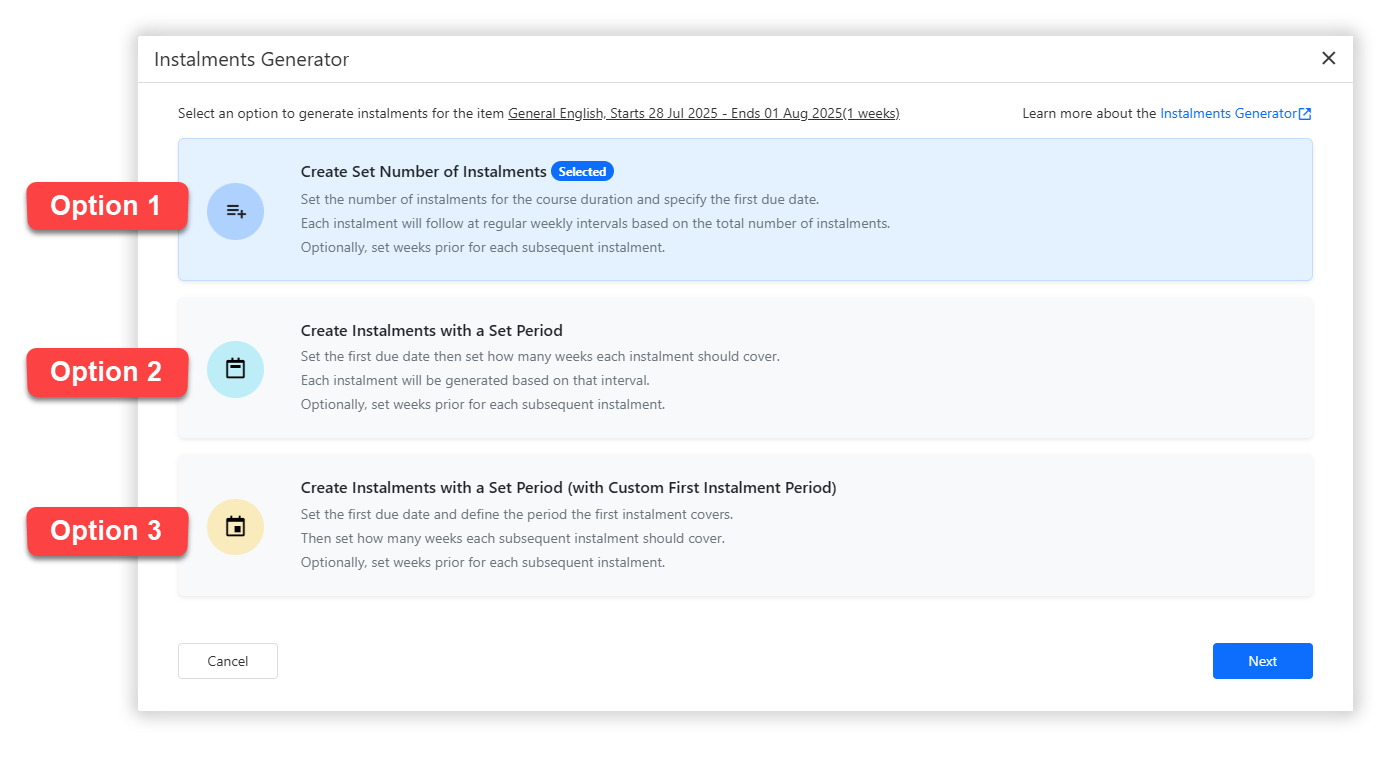Offers Instalments Generator
Overview
eBECAS/EDMISS provides an easy-to-use tool for creating structured payment plans during the Offer stage. Instalments can be set by a fixed number, weekly intervals, or customised phase-based logic to fit your requirements.
These options allow you to generate evenly distributed payment plans that suit your operational requirements when you're working with Offers.
Understanding Instalments
Before exploring the available options, it's helpful to understand the key concepts and terms used throughout this article:
Instalments
Instalments are scheduled payments that divide the total amount payable for a course or item into smaller, manageable portions. Each instalment have their own due date and amount.
Instalment Period
The instalment period refers to the portion of the course or item that each instalment covers. It defines the start and end dates the instalment relates to, usually aligning with the course or item duration. This helps ensure that payments are tied to the delivery of services over time.
Instalments vs Invoices
The term instalments is used during the Offer stage, while invoices apply once the offer is accepted and the student is enrolled. When an offer is converted, the instalments are automatically generated as invoices.
Considerations for the Instalments Generator
Offer Instalments Around Holidays
By default, offer instalments are created without taking holidays into account, so a due date may fall within a holiday period. However, if you prefer instalment due dates to avoid holidays, you can update your Offer System Settings to automatically adjust them.
Updating these setting will not modify existing instalment plans but will apply to future payment plans.
When Offers Instalments Cannot Be Created
They cannot be created in the following cases:
Offer Items that are not included in an Offer Group.
Offer Courses that are Unit of Study-based or Subject-based courses.
Ensure all items and courses meet these requirements before generating instalments.
Instalments Generator Options
You can select from several options to generate a payment plan with multiple instalments. Each option applies a different method for setting the number of instalments, the due dates and for splitting the total amount.
The maximum number of instalments that can be created is limited by the duration (in weeks) of the offer item. The minimum number is one, which represents a single instalment.

Option 1: Create Set Number of Instalments
This option lets you create a payment plan by defining the total number of instalments and setting when each is due.
The system will divide the course or item period as evenly as possible across the instalments selected. For example, if you select 2 instalments for a 10-week course, each will cover 5 weeks. If you select 3 instalments, the weeks may not split evenly, but the system will adjust to ensure the entire course or item period is covered proportionally.
By default, the due date for each instalment is set to the start of its period. This can be adjusted using the optional timing setting.
You can customise this option using the following settings:
Number of Instalments[Number]: Total number of instalments to be created.
First Instalment Due On [Date]: The due date for the first instalment.
Subsequent Instalments Due [Number] Week(s) Prior to the Instalment Period OPTIONAL: Number of weeks before each instalment period begins that the payment is due.
Option 2: Create Instalments with a Set Period
This option lets you create a payment plan by setting a fixed number of weeks that each instalment should cover, with specifying the first instalment’s due date.
The system will generate instalments in fixed intervals based on the number of weeks you define. For example, if you enter 4 weeks, each instalment will cover a 4-week period. If the course or item duration does not divide evenly, the system will adjust the final instalment to ensure the entire period is covered.
By default, the due date for each instalment is set to the start of its period. This can be adjusted using the optional due setting.
You can customise this option using the following settings:
First Instalment Due on [Date]: The due date of the first instalment.
Instalments Every [Number] Week(s): Number of weeks each instalment covers.
Subsequent Instalments Due [Number] Week(s) Prior to the Instalment Period OPTIONAL: Number of weeks before each instalment period begins that the payment is due.
Option 3: Create instalments with a set period (with Custom First Instalment Period)
This option lets you create a payment plan by setting the first instalment’s due date and the period it should cover, then a fixed number of weeks that each subsequent instalment should cover.
The system will generate the first instalment based on the due date and coverage period you specify. Subsequent instalments will be generated in fixed intervals, each covering the number of weeks you define. For example, you can set the first instalment to cover 2 weeks and each subsequent instalment to cover 4 weeks. If the remaining course or item duration does not divide evenly, the system will adjust the final instalment period to ensure full coverage.
By default, the due date for each instalment is set to the start of its period. This can be adjusted using the optional timing setting.
You can customise this option using the following settings:
First Instalment Due on [Date] Covering [Number] Week(s): The due date of the first instalment and the number of weeks it should cover.
Subsequent Instalment Every [Number] Week(s): Number of weeks each subsequent instalment covers.
Subsequent Instalments Due [Number] Week(s) Prior to the Instalment Period OPTIONAL: Number of weeks before each instalment period begins that the payment is due.



